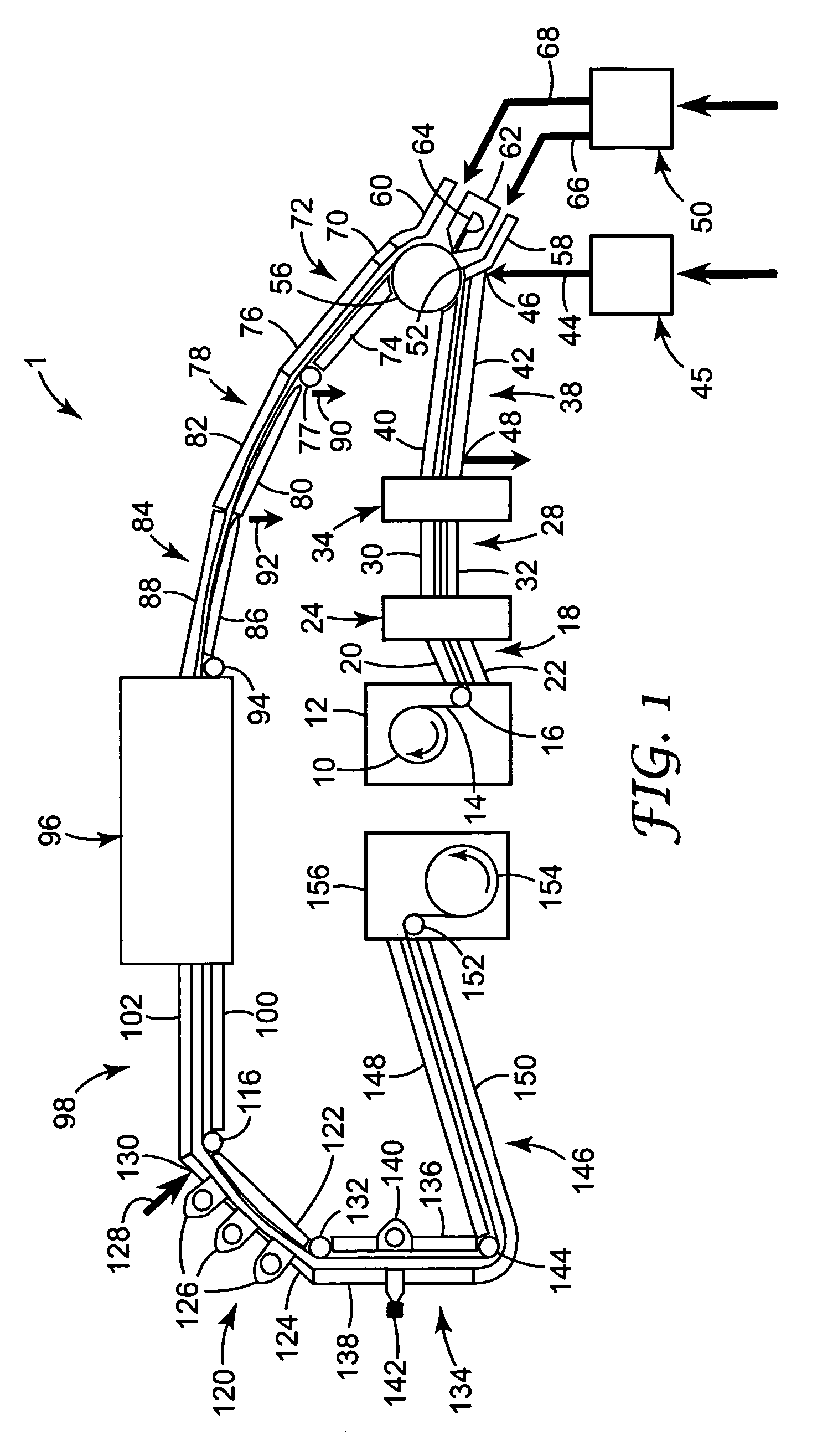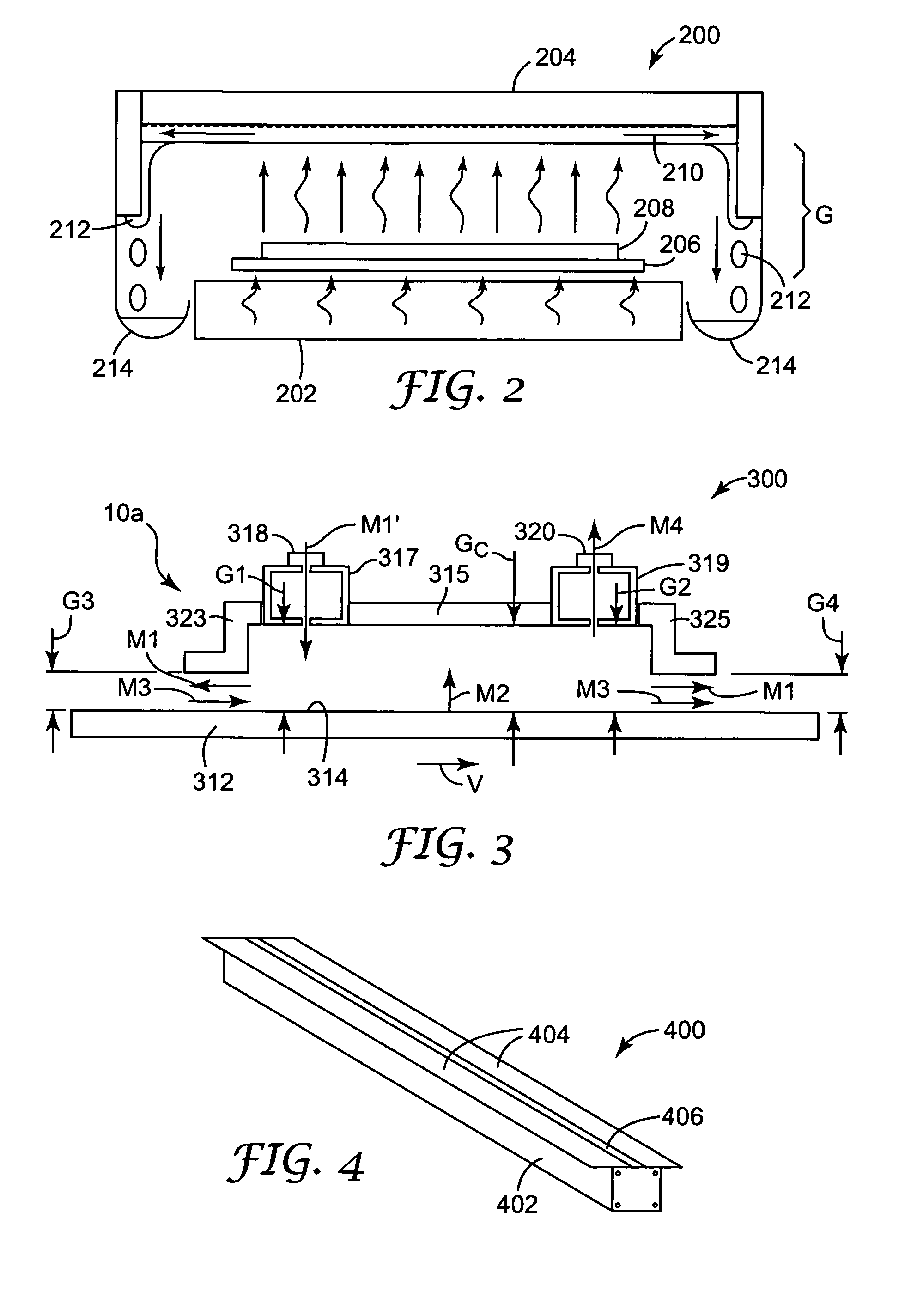Coating process and apparatus
a technology of coating process and equipment, applied in lighting and heating equipment, drying machines with progressive movements, furnaces, etc., can solve the problems of large volume of filtered air or specialty gases, high cost of auxiliary equipment, and inability to selectively draw primarily the desired gas phase components of air handling systems, etc., to reduce materially the particle count.
- Summary
- Abstract
- Description
- Claims
- Application Information
AI Technical Summary
Benefits of technology
Problems solved by technology
Method used
Image
Examples
example 1
[0096]A single close-coupled enclosure was constructed to illustrate the effect of certain variables. FIG. 9 shows a schematic side sectional view of a close-coupled enclosure 900. Close-coupled enclosure 900 has overlying control surface 902, underlying control surface 904 and side 906 equipped with sample ports A, B and C for measuring pressure, particle count and oxygen levels within close-coupled enclosure 900. Overlying control surface 902 and underlying control surface 904 are spaced apart a distance he1. Underlying control surface 904 is spaced apart from substrate 14 a distance he2. Upstream transition zone 908 has underlying and overlying web slot pieces 910 and 912. These web slot pieces are spaced apart a distance h1a, and have length l1. Underlying web slot piece 910 is spaced apart from web 14 a distance h1b. Downstream transition zone 914 has underlying and overlying web slot pieces 916 and 918. These web slot pieces are spaced apart a distance h2a, and have length l2....
example 2
[0103]Example 1 was repeated using an 18 m / minute web velocity V. The particle count results are shown in FIG. 13 (which uses a logarithmic particle count scale). FIG. 13 demonstrates that for a moving web, material particle count reductions were obtained, at, e.g., pressures greater than −0.5 Pa.
example 3
[0104]Using the method of Example 1, a −0.5 Pa enclosure pressure was obtained in close-coupled enclosure 900 by adjusting the flow rates M1′U and M1′L to 24 liters / min and by adjusting the rate of gas withdrawal at outlet 932 to 94 liters / min. In a separate run, a +0.5 Pa enclosure pressure was obtained by adjusting the flow rates M1′U and M1′L to 122 liters / min and by adjusting the rate of gas withdrawal at outlet 932 to 94 liters / min. The respective particle counts were 107,889 at −0.5 Pa, and only 1 at +0.5 Pa. For each run the enclosure pressure above the substrate was measured at several points along the length of close-coupled enclosure 900 using holes 2, 5, 8, 11 and 14 (see FIG. 10). As shown in FIG. 14, the enclosure pressure above the substrate was very steady for each run and did not measurably vary along the length of close-coupled enclosure 900. Similar measurements were made below the web using ports A, B and C. No variation in pressure was observed in those measureme...
PUM
| Property | Measurement | Unit |
|---|---|---|
| pressure | aaaaa | aaaaa |
| volume | aaaaa | aaaaa |
| height | aaaaa | aaaaa |
Abstract
Description
Claims
Application Information
 Login to View More
Login to View More - R&D
- Intellectual Property
- Life Sciences
- Materials
- Tech Scout
- Unparalleled Data Quality
- Higher Quality Content
- 60% Fewer Hallucinations
Browse by: Latest US Patents, China's latest patents, Technical Efficacy Thesaurus, Application Domain, Technology Topic, Popular Technical Reports.
© 2025 PatSnap. All rights reserved.Legal|Privacy policy|Modern Slavery Act Transparency Statement|Sitemap|About US| Contact US: help@patsnap.com



